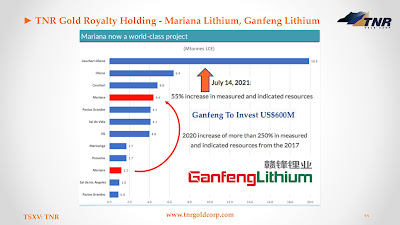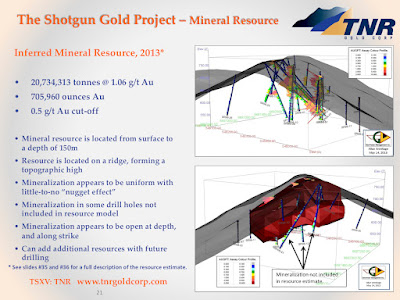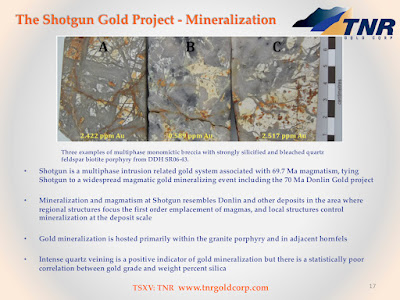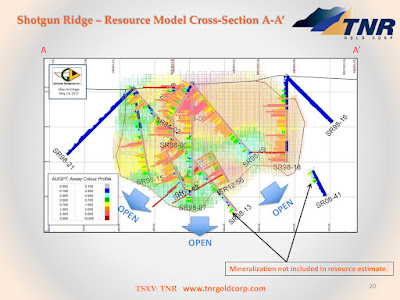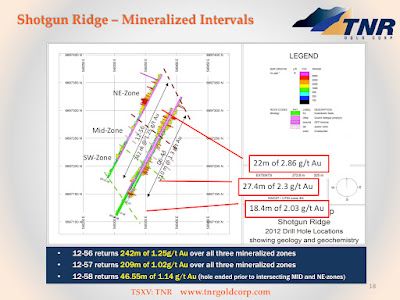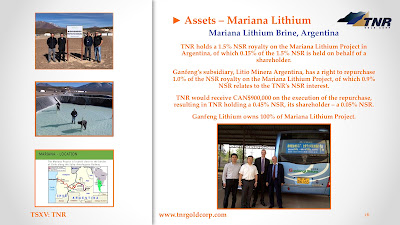For all TNR Gold shareholders, it will be very important that the Mariana Lithium Project's annual production capacity of 20,000 lithium chloride is called Phase 1!
“Each project can be expanded in two stages. Our current goal is to move them into production to bring more jobs to the community and generate more value for the industry,” Luo said. To carry out the expansions, which will be decided based on market conditions, an investment of USD 800 million is required for each of the projects."
“Last year we repaid our investment loan in full, and our Company has no debt. We believe that the recent market prices of our shares do not properly reflect the underlying value of the shares. Our transformation from the project generation junior mining company into the cash flow generating royalty company will bring the necessary catalyst for the market valuation of our assets."
Alastair Ford: TNR Gold’s Recent Rejection of a Takeover Bid From Lithium Royalty Has Shone a Spotlight on the Value of Its Royalty and Exploration Portfolio
"A recently published research report on TNR, written by Fundamental Research Corp, reckons fair value for the company at C$0.22 per share. The current price is significantly lower than half of that." (Alastair Ford)
“Since our initiating report in September 2023, TNR’s royalty projects have made significant progress,” the analysts wrote in a report. “TNR is up 40% since September 2023.” (Emily Jarvie)
"The report from Fundamental Research underscores the company's near-term royalty potential, particularly from Ganfeng Lithium's Mariana project, and reaffirms a Buy rating with an adjusted fair value estimate of C$0.24 per share." (Angela Harmantas)
Wednesday, January 29, 2025
"The Chinese-owned company will be the third to start production in the province, in this case to produce lithium chloride. The mineral that will be used as raw material will be extracted in pools located in the Salar del Llulllaillaco, more than 10 hours from Salta Capital.Following the launch of the lithium production plants of the French company Eramine and the Korean company Posco in 2024, the third lithium production plant installed in Salta will be officially inaugurated on Wednesday, February 12, in the General Güemes industrial park. This marks the conclusion of the Mariana project, which has been carried out since 2014 by the company Litio Minera Argentina SA, a subsidiary of the Chinese-owned company Ganfeng Lithium Group Co.When it reaches its peak production, the new plant will produce 20,000 tons of lithium chloride per year, which will be used to manufacture lithium batteries in the Asian market by the same business group. The company has integrated the entire production process, from the mineral, through batteries for different uses (cars, cell phones, etc.), to the recycling of its own products.The mineral will be extracted from the Salar del Llullaillaco, located 430 kilometers from the capital of Salta (although the trip takes between 10 and 12 hours) and 95 kilometers from the nearest town (Tolar Grande), at 3,750 meters above sea level. There, Ganfeng built gigantic pools where the pre-concentration of the brine is carried out by solar evaporation. There, elements such as sodium and potassium chloride are separated, increasing the lithium concentration. Then, through a chemical reaction, sulphate, magnesium and boron ions are removed; and the resulting brine is subjected to forced evaporation until it achieves the lithium concentration levels required for its transport to the Güemes plant.Once at the industrial park, the brine will be purified and then evaporated (72% of the water contained will be removed) and crystallized until obtaining a high-purity lithium chloride that will be bagged for shipment to China.In order to be able to produce in the Puna, the company built the first autonomous solar park in the country, with a generation capacity of 120 MW in solar panels and 288 MWh of battery storage manufactured by Ganfeng itself.They have generated around 11,600 jobs since the beginning of construction and currently the company has just under 500 workers, which would be the staff that will carry out production both at the salt flat and in Güemes and in the administrative offices in Salta Capital. Both in the construction process and in the production stage, the company complied with the provincial law that establishes the obligation that 70% of the staff be from Salta.In addition, the company has developed an important social work program with a strong impact on the communities of Tolar Grande and General Güemes. These include, among other actions, financial assistance for the construction of classrooms, professional internships for students of technical schools, support for cleaning campaigns and the construction of community spaces." (InSalta - translated by Google)








































